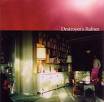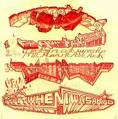This year has been marked by tragedy and glory, from Cars reuniting with Todd Lundgren to Guns and Roses reuniting sans Slash (but with cornrows). Not least exciting was the rise of Tapes n' Tapes, who released one of my favorite albums last year and catapaulted themselves onto the international stage. Their appearance at Pitchfork was great, but, in my book, not as great as their appearance at Schubas in 2006, when the audience, including reviewers, were rapt rather than drenched (in sweat). Doesn't get much better than that. Here are a few of the terribly, terribly important events, records and thingies that helped me keep my poise, my balance, and my rhythm this year.
My Music Obsessions in 2006
9. Clell Tickle: Dreamweaver
8. My neighbor's four year old enjoys singing the "laffy taffy" song.
7. Joanna Newsome at Logan Square
6. Ranters and Crowd Pleasers by Greil Marcus
5. "Since You Were Mine" by Cyndi Lauper
4. Venice by Fennesz
3. Jen's Lekman's performance at the Pitchfork festival, followed by The Nationals.
2. Born to Run by Bruce Springsteen
1. This Year's Model by Elvis Costell
The Terribly Important Records of 2006
 #10 Taiga by ooioo
#10 Taiga by ooiooThere is some debt to Can on this album, as one all things Boredoms; it took patience to sit through some songs, but everytime I hear it I'm amazed by the loose yet cohesive structure. Yoshimi P-We, a fomer Boredoms collaborator, leads ooioo with guitar lines that vary in apparent inspiration from Fugazi to King Sunny, from spastic, arhythmic noises to techno thumps, and howls infectious chants sounding like some Japanese double-dutch. Apparently Taiga means "Big River" in Japanese or "Forest" in Russian, so it may be true, as their website advertises, that the album is about communication within nature, and between nature and society.
 #9 Nightlife by Erase Errata
#9 Nightlife by Erase Errata  #8 Beast Moans by Swan Lake
#8 Beast Moans by Swan Lake #7 A Tragic Treasury by The Gothic Archies
#7 A Tragic Treasury by The Gothic ArchiesI want to be friends with Steven Merritt and Lemony Snickett. Merritt returns with this Goreyesque companion to Lemony Snickett's "A Series of Unfortunate Events." The music is both poppy and dark, anguished and hilarious. I hear Snicket plays accordian on the album. I can't tell if Merritt is making fun of or paying tribute to goth music, and I suspect there is a little of both here, where Merritt compares the second-person to a "freakshow," screams, drives without brakes, walks in haunted battlefields, and takes his gargoyle out for a stroll.
 #6 Destroyer's Rubies by Destroyer
#6 Destroyer's Rubies by DestroyerDan Bejar has his own wiki now (one dedicated to him), chronicling his lyrical endeavors and which begins with the simple words of caution, that "no attempt is made at describing what a song is about. I don't know what any of them are about. Nobody does." Cuidado! Still, Bejar has put out an album which I can only compare to a "Born to Run" for art school students. It has the full sound of Springsteen's BTR period, complete with soaring piano lines, catchy guitar hooks and a straight-ahead rhythm section. And then the lyrics; "Typical me, typical me, I gave my cargo to the sea, I gave the water what it always wanted to be..." Whether it be projectivist poetry or dylanesque riposte ("Quiet Ruby, someone's coming...approach with stealth...oh, it's just your precious American underground, and it is born of wealth...") Bejar's lyrics are fascinating for their play with meaning and the suspense in the rock idiom, as well as the concept of quilting terms and phrases with other songs in his catalogue to establish more (or less) meaning. One annoying aspect of Destroyer is the apparent grumpiness of Bejar towards the indie rock establishment, however well founded. His lyrics are frequently referring to this, and he does not carry it out with the absurd wit and good-humor Steven Malkmus, for example, could. Instead, his lyrics and skeletal arrangement turn out to be frailer than they would be had he simply focused on using his considerable skill as a crafter of songs and less on establishing himself as cultural outsider. On Destroyer's Rubies, he came a long way toward doing so. The arrangements have opened up dramatically, and his lyrics are as clever as ever without seeming overwrought. Earlier this year, this would have been my top album of 2006, and in terms of Lester Bang's terms of measurement, frequency of use, it may still be.
 #5 Son by Juana Molina
#5 Son by Juana Molina  #4 Drums Not Dead by The Liars
#4 Drums Not Dead by The Liars #3 Savane by Ali Farke Toure
#3 Savane by Ali Farke ToureAli Farke Toure's swan song ranks with his best works. Toure's guitar is characteristically hyperactive, hypnotic, and hallucinatory.
 #2 Return to Cookie Mountain by TV On the Radio
#2 Return to Cookie Mountain by TV On the Radio #1 Yellow House by Grizzly Bear
#1 Yellow House by Grizzly BearIt took me a while before I realized that this album appeals to me the same way Cocteau Twins albums do. There is something more than just an ethereal, airy quality to the production, but a strange sense of seeing the construction of the songs displayed on the outside where most would display them inside. One gets the sense of exploration within the recording. When a drum or clarinet enters the song, and there are many moments when it could as easily be one as the other, it is a thoughtful and honest gesture, not just another idea that stuck to the wall. The quiet beauty of the album is huge leap from their last album, Horn of Plenty, which was intentionally roughed up with fuzzy, four-track production, conjuring a morose Animal Collective. It worked, but their work sounds better in this new environment. The term "Yellow House" is a bit of a mystery; does it reference the Maggie Dietz poem? The mythic temple of the sun? Does it simply function as an image, or a trope? The implied simplicity in the title (a recognized familiarity, a house, and the house is yellow) Ed Droste seems to turn quietly inward, creating a landscape empty of human life yet shimmering with it along the edges, so familiar that one can almost smell the light dust from the wood floor of your grandmother's house. The photography within the album, by Patryce Bak, is prescient; like the music, it evokes an empty, careworn house which seems to be dreaming, abandonded as it is, momentarily, by the people who have given it life and purpose. The whole album seems to sound from a slumbering place, a parallel world similar to ours but with unspecified and nuanced differences. "My love," sings Droste, "is another kind." It is hard not to love an album this haunted.













